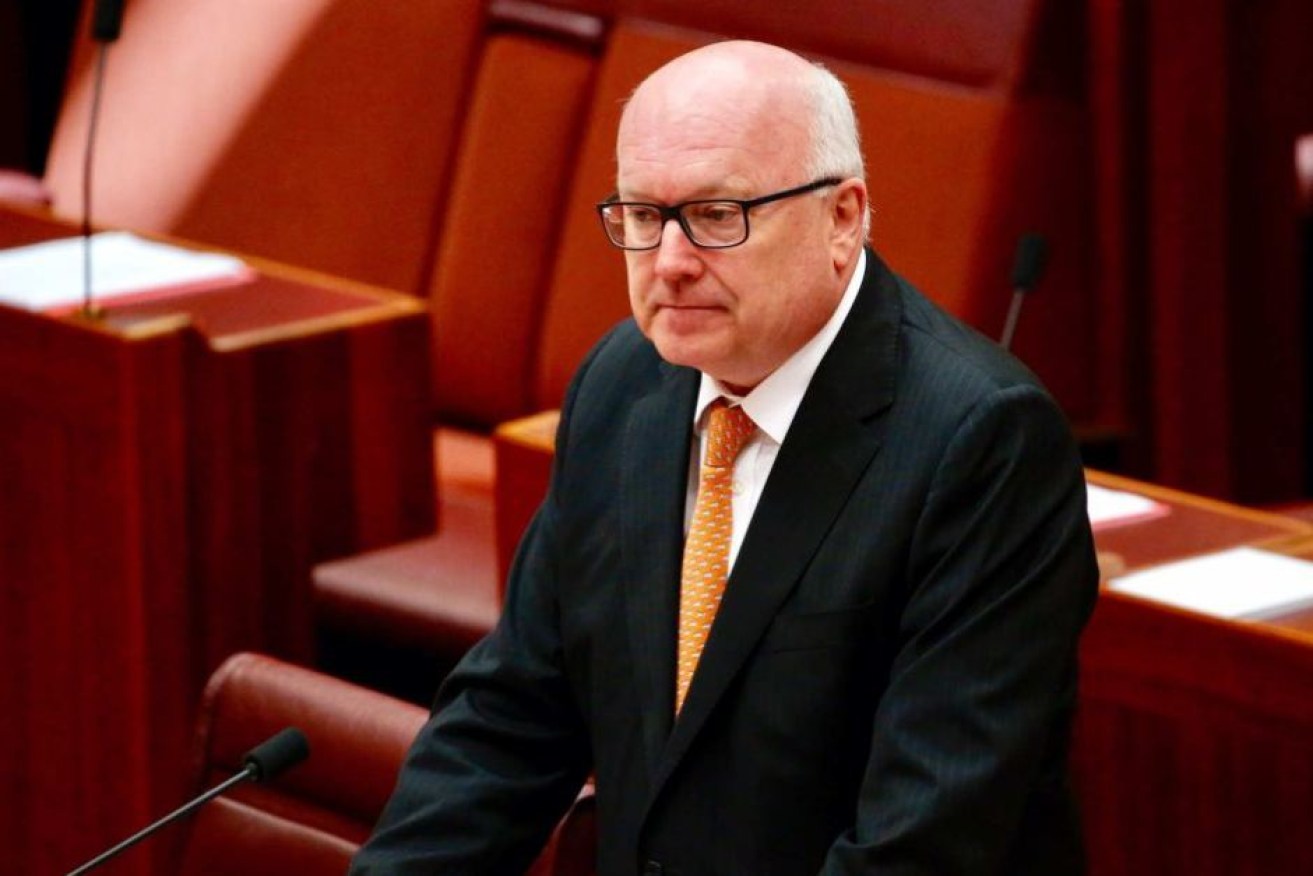Government prepares for the complex and messy debate over religious freedom


George Brandis infamously said people had a "right to be a bigot". Photo: ABC
When former attorney-general George Brandis told the Senate five years ago that people had a “right to be a bigot”, it caused an uproar.
The context was a debate around amending the nation’s racial discrimination laws.
At the time, the Abbott government had promised to repeal section 18C of the Racial Discrimination Act on free speech grounds, which made it unlawful for someone to publicly “offend, insult, humiliate or intimidate” a person or a group of people.
On Sunday, Finance Minister Mathias Cormann threw a curveball into the religious freedom debate – the right to be an atheist – suggesting that any reforms must also ensure that discrimination is not applied to those who don’t hold religious views.
But what does the right to be an atheist really mean if it doesn’t apply, for example, to atheist teachers or gay teachers in religious schools as Senator Cormann insists it would not?
The answer would appear to be … not very much.
The right to be an atheist, appears on first perusal to be a twist in a debate that is currently fixated on the fate of cases like Israel Folau, the former Wallabies star sacked in May for an Instagram post on April 10 that suggested gay people would go to hell.
“We want to ensure that Australians do not have to experience discrimination of any kind,” Senator Cormann told ABC TV on Sunday.
“We are certainly committed to press ahead with the introduction of legislation to put in place a Religious Discrimination Act. It is to ensure that people are not subject to inappropriate, unacceptable levels of discrimination based on their religious beliefs, or based on not having any religious beliefs at all.”
His response immediately raised questions over whether the government was suggesting that religious schools could not discriminate against teachers who did not share their religious values, lived in de facto relationships or were gay.
But Senator Cormann told The New Daily he was not suggesting that, and that broad exemptions would continue to apply to allow religious schools to hire staff that share their values.
”As with all other anti-discrimination acts there will be a list of appropriate exemptions,” he said.
“The obvious exemption in the Religious Discrimination Act will be the provision that allows religious schools and relevant religious institutions to employ staff consistent with their faith.
“Schools are well aware of our proposed approach to this and have been appropriately consulted on this.”
The right not to discriminated against for being an atheist or not holding religious views was raised by Prime Minister Scott Morrison in the pre-election Leaders’ Debate in Brisbane on May 3.
“I’m passionate about freedom of religion in this country. Whatever your faith may be, whether it’s Christian, whether it’s Islam, whether it’s Buddhist, or whichever it may be – and if it’s no religion at all, that is I think one of the most fundamental freedoms that any Australian has,” Mr Morrison said.
But those words clearly need to be weighed against exemptions that the Morrison government is proposing in the legislation.
The Morrison government also appears cool on the idea of advancing a blanket exemption for workers to say or do anything in the workplace based on religious freedom as raised by Eric Abetz and Barnaby Joyce.
Clearly, this is a complex debate that does not divide neatly into “Left” or “Right” positions.
For example, employment lawyer Josh Bornstein has warned against the unintended consequences of “progressives” and gay activists arguing that Folau should be sacked on contract law grounds.
https://twitter.com/JoshBBornstein/status/1134804570217955328
“If you are a progressive arguing that Folau has caused harm to gay people, that’s fine, but going to the barricades on contract law is an excruciatingly bad take,” he said.
“Ask Scott McIntyre, Yassmin Abdel-Magied, Angela Williamson.”
Mr McIntyre is a sports journalist sacked from SBS for “inappropriate” tweets on Anzac Day that questioned the national day and raised alleged atrocities by Australian troops.
Presenter Abdel-Magied was the target of a media storm for tweeting “Lest We Forget” Manus and Nauru on Anzac Day.
Ms Williamson was sacked by Cricket Australia after pro-choice tweets on a personal account arguing for abortion reform.
On Sunday, it was reported that Folau was ready to take down the controversial posts at the centre of his war with Rugby Australia until he phoned his father Eni Folau.
A Christian pastor, he told his son that if he removed the posts – which noted a Bible passage that warned “drunks, homosexuals, adulterers, liars, fornicators” would got to hell – that he would be disowning the words of God.








